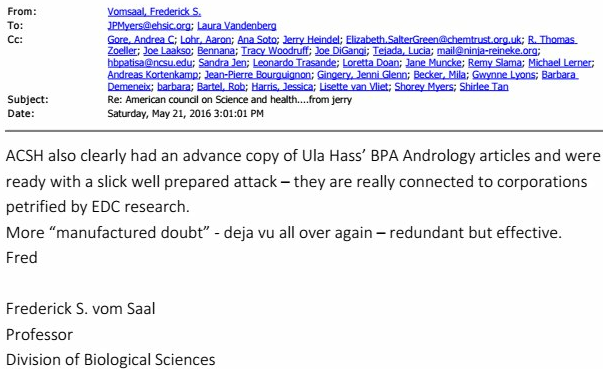Here at ACSH, we're used to conspiracy theories. There are very few that we have neither heard nor debunked.
For instance, there is no conspiracy between the FDA and Big Pharma to suppress a cure for cancer. Likewise, there is no conspiracy to promote an influenza vaccine in place of a "pneumonia vaccine" (which doesn't exist). Glyphosate isn't poisoning people and microcephaly isn't caused by Monsanto, despite the unhinged claims by the anti-GMO, anti-vaxxer group March Against Monsanto.
Naturally, because we are a pro-science organization that likes to call out nonsense, we have been the target of various conspiracy theories. SourceWatch, a website operated by conspiracy theorists who believe that the Koch Brothers control the universe, claims that ACSH is a corporate front group, even though only 4% of our funding comes from industry.
Thanks to emails obtained from a FOIA request (not submitted by us), we have now discovered that we have been secretly a part of another conspiracy: ACSH somehow obtains research papers in advance and debunks them!
It's Not a Conspiracy, Professor. It's Called Peer Review
Professor Frederick vom Saal of the University of Missouri-Columbia frets that your endocrines are being disrupted. (They aren't.) A lot of research in the field of endocrine disruption is very bad. One particular stink-burger was debunked by our own Dr. Josh Bloom.
In a nutshell, the authors engaged in a bit of data dredging (a.k.a., p-fishing). They gave groups of rats different doses of BPA, then tested for a multitude of possible anatomical and physiological differences. This is a terrible experimental design because it isn't hypothesis driven. Instead, the authors looked for any differences at all. The trouble is that, if given enough variables to examine, a statistically significant difference can be found by sheer chance.
Predictably, the study yielded bizarre, contradictory, biologically implausible results. For example, the study concluded that a low dose of BPA causes female rats to swim slower but not higher doses. This simply doesn't make sense. (And no, hormesis can't be used as a magical explanation.) The study was poorly designed, and it should never have passed peer review. But it did, which is why post-publication peer review exists.
But that's not how Dr. vom Saal sees it. No, like one of his BPA-dosed rats, he smells a conspiracy.

Dr. vom Saal believes that we "clearly had an advance copy" of the paper and "were ready with a slick well prepared attack" because we are "connected to corporations petrified by EDC [endocrine disrupting chemical] research."
Here's the truth: First, we didn't have an advance copy of the paper. (Even if we did, so what? Journals regularly issue papers in advance for science writers to scrutinize prior to official publication. It's called the embargo system.) If Dr. vom Saal is implying that Dr. Bloom somehow hacked into the journal to get the paper before it was released, he should note that Dr. Bloom has only recently learned how to use Twitter.
Second, nobody is terrified by endocrine disruptor research. Much of it is not very well done, and a substantial proportion of it depends on biologically implausible assumptions. If hormesis is real, it is probably only a minor player in physiological outcomes.
Third, if Dr. vom Saal is truly worried about his endocrines being disrupted, he should go on a crusade against things like marijuana and soy -- both of which (if endocrine disruption was real) would be worse than BPA.
No, Dr. vom Saal, there is no conspiracy. Instead, the paper was read, laughed at, and debunked within a few minutes. How? Because scientists are trained to be skeptical and to find flaws in research methodology. That's what all scientists do for a living.
Well, the good ones, anyway.




